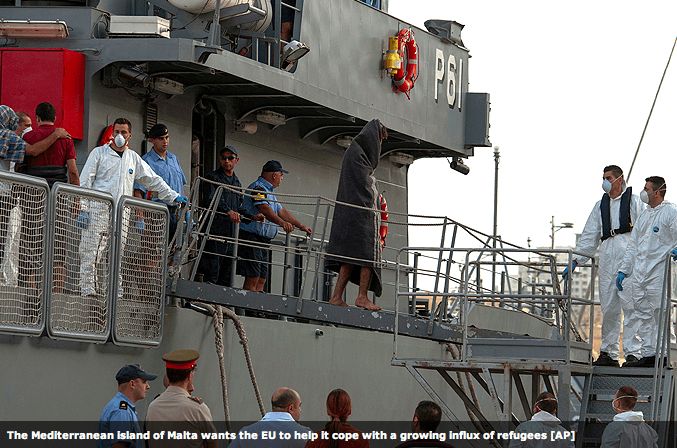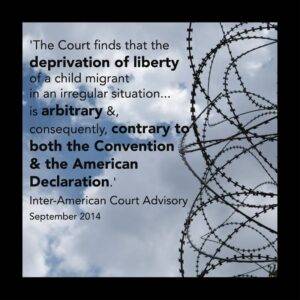USCCB Chairman Decries Opening of Family Detention Center in Dilley, Texas, Proposes More Humane Alternatives to Detention for Vulnerable Families
Families are traumatized from journey
Detention not a tool for deterrence
More humane alternatives exist
December 16, 2014
WASHINGTON—Bishop Eusebio Elizondo, auxiliary bishop of Seattle, chairman of the U.S. Conference of Catholic Bishops’ Committee on Migration, decried the opening of a 2,400-bed detention center in Dilley, Texas, constructed to house, among others, families fleeing persecution in Central America.
The detention center, operated by a private, for-profit group, was inaugurated December 15.
“It is inhumane to house young mothers with children in restrictive detention facilities, as if they are criminals,” said Bishop Elizondo December 16. “Already traumatized from their journey, these families are very vulnerable and need care and support, not further emotional and psychological harm.” Studies have shown that detention has a harmful psychological impact on children.
Bishop Elizondo added that the Obama administration’s pursuit of a deterrence policy– including detention and interdiction– against children and families fleeing violence undermines basic human rights.
“Many of these families are fleeing persecution and should be afforded the full benefit of domestic and international law,” Bishop Elizondo said. “As we saw in the case of Artesia, detention denies mothers and children with valid legal claims meaningful access to due process, including legal representation.” A temporary detention facility in Artesia, New Mexico, housing families was recently closed down, in part, because of strong opposition to due process violations and conditions there, especially for children. The average age of children detained in Artesia was six and a half years old.
Bishop Elizondo added that humane alternatives to detention exist, particularly community-based alternatives based on a case management model.
“Past community-based programs have shown that vulnerable groups such as families can be placed in a community setting and still appear at their immigration hearings, provided they are given the proper support,” Bishop Elizondo said. “The government should explore this humane alternative and not cause further harm to these families, particularly children.”
---
Keywords: U.S. Conference of Catholic Bishops, USCCB, Bishop Eusebio Elizondo, Committee on Migration, refugees, migrants, immigrants, human trafficking, National Migration Week, Artesia, Dilley, Central America, unaccompanied children, deportations, detentions
# # # # #
MEDIA CONTACT:
Norma Montenegro Flynn
O: 202-541-3202
M: 703-717-2941
Europe News Roundup
This is a compilation of the tweets by the Europe Regional Coordinator of the International Detention Coalition. For live updates, follow @idceurope
Regional:
Human rights protection challenges affecting migrants at sea
New report highlights long-term arbitrary detention of stateless persons in Europe
The EU allocated about 700m euro to support asylum procedures but 1,820m euro for border controls
European Migration Network highlight that most EU states detain under Dublin III, but several don’t define objective criteria for absconding risk in law
New report considers rights of persons deprived of liberty at EU international airports
The 25th anniversary of the UN Convention on the Rights of the Child was marked with a conference on unaccompanied child migration and a radio show on unaccompanied children
Finland:
The European Committee for the Prevention of Torture observations on Finland: new immigration detention centre is prison-like
Germany:
New profile on the Global Detention Project reveals the use of immigration detention is steadily decreasing despite immigration pressures, with a debate about the need to detain at all
Greece:
New report from Europe’s torture prevention body highly critical of immigration detention policy and practice
Immigration Detention costs a minimum of EUR 28.7 million per year says MIDAS report

Italy:
Senate Commission says prolonged immigration detention of 18 months has not led to increased returns
Malta:
IDC Member aditius foundation says age assessment of asylum seekers should not be conducted in detention and urges for the use of alternatives to immigration detention
Malta: PM calls for detention policy to be reviewed
Macedonia:
Council of Europe torture prevention body visits “reception centre for foreigners” in Skopje for first time
Netherlands:
European Human Rights Commissioner says the longer immigration detention continues, the less likely departure becomes and urges an end to the detention of children seeking asylum
UK:
The Unlocking Detention campaign continues, with fantastic contribution from a range of experts reflecting on the near 30,000 migrants who are detained without time limit in the UK each year and the size of the detention estate is rising:
- A crisis of harm in immigration detention
- Immigration detention in the media: anarchy and ambivalence
- UK govt is still detaining children by ‘calling them adults’
Home Office stats (see 12.3) shows one child was detained 12-18 months, an age disputed case
Home Office statistics (see 12.3) show one child was detained 12-18 months in an age disputed case.
Spain:
Deporting would-be migrants to Europe without opportunity for appeal
Turkey:
Calling for an end to child detention, and urging NGOs support the Global Campaign
IDC Press Release: Ending Immigration Detention of Children for International Human Rights Day
MELBOURNE (10 December 2014) - On International Human Rights Day, the International Detention Coalition (IDC) is calling on Governments to commit to ending the immigration detention of children. The Coalition, which comprises hundreds of organisations around the world, says millions of children are impacted by detention, and their rights are being violated unnecessarily.
Director of the Coalition, Grant Mitchell, said “countless children have been abused in detention centres around the world in the past year. This is damage to the most vulnerable is unnecessary when we know there are more effective and humane approaches to migration that allow states to achieve policy goals without harming the health and well-being of children.”
“There has been a move in some countries away from detaining children and using more innovative child protection approaches,” said Mr. Mitchell.
Immigration detention is never, under any circumstance, in the best interests of the child. Conclusive evidence shows that children are being psychologically damaged in detention. “This international human rights day we are urging more governments to take steps towards ending the use of immigration detention for vulnerable groups, such as children,” Mr. Mitchell said.
The UN Committee which oversees the Convention on the Rights of the Child, which recently celebrated its 25th anniversary, has recommended that children be immediately released from detention and live in non-custodial, community based alternatives to detention while their immigration status is being determined, acknowledging that detention of children on the basis of their migration status constitutes a violation of child rights.
The Coalition chairs an inter-agency working group comprised of sixteen prominent UN groups, intergovernmental organizations, and civil society representatives who collectively represent stakeholders in every country of the world. Together, they have committed to a 3-year term of engagement in which they will seek to assist states to “completely and expeditiously” end the practice of child immigration detention.
[gview file="https://idcoalition.org/wp-content/uploads/2014/12/PR_101214_IDC_DRAFT.pdf"]
UNHCR HC’s Dialogue on Protection at Sea "raises vital human rights issues"
GENEVA (10-11 December) – Today, the UN High Commissioner for Refugees (UNHCR) concludes its annual High Commissioner’s Dialogue on Protection Challenges, focusing on the critical challenges facing refugees and asylum seekers arriving by sea.
This year’s 'Protection at Sea' focus is a key element of UNHCR's two-year Global Initiative on Protection at Sea, which aims to support States to take action to limit the loss of life at sea, as well as the exploitation, abuse and violence to which refugees, asylum seekers, stateless persons and migrants are subjected in their journeys. The Dialogue brings together States, NGO's, IGO participants and experts from around the world to exchange views about gaps and challenges in the protection of refugees and asylum seekers.
Critical topics for discussion included: criminalization and detention of asylum seekers and irregular migrants, rescue and disembarkation, reception, and addressing the drivers of flight. The IDC’s Europe Regional Coordinator, Ms. Jem Stevens, attended the Dialogue on behalf of the IDC and brought specific attention to the systematic and arbitrary detention of migrants arriving by sea:
“The systematic detention of migrants arriving by sea is by definition arbitrary, since it is not based on an individualized assessment of risk and it is not applied only as a last resort. Thus, as a general rule, asylum seekers, stateless persons, trafficking victims and survivors of torture should never be detained based on immigration status alone. . . . Disembarkation areas cannot be treated as zones of exception.”
In his opening remarks, the UN High Commissioner for Refugees, Mr. António Guterres, set the stage, drawing attention to the need for a concerted global, humanitarian response.
“States' responses to this complex and growing challenge have been mixed. But one thing is clear: focusing only on border control and deterrence will not solve the problem."
High Commissioner Guterres was later joined by the newly-appointed UN High Commissioner for Human Rights, Mr. Zeid Ra'ad Al Hussein, who similarly noted the urgent need to adopt protection mechanisms for those people who desperately risk their life in search of safety and security:
"When migrants are left to drift for weeks without access to food and water; when ships deliberately refuse to rescue migrants in distress; when children in search of family reunification are detained indefinitely, denied education and care, or returned to perilous situations – these are grave human rights violations.”
High Commissioner Al Hussein reminded the participants that, although states have a right to determine who enters their territory, they are limited by international law and fundamental human rights principles. For example, the UN Working Group on Arbitrary Detention has made clear since 2008 that, “criminalizing [irregular] entry into a country exceeds the legitimate interest of States to control and regulate [irregular] immigration and leads to unnecessary detention.”
"States must refrain from using harsh interception and deterrence measures to prevent people from reaching their territory. On arrival, every person has the right to individual determination of her or his situation, and specific attention must be paid to those who are at particular risk, such as children, pregnant women, victims of torture, survivors of sexual or gender-based violence, persons with disabilities, and older persons."
Throughout the two-day Dialogue, a number of key points were discussed and agreed-upon, including that:
- search and rescue (SAR) operations need increased regional support;
- states should provide emergency care, psychological support and should undertake screening for vulnerabilities during disembarkation and reception;
- there is a need to combat the xenophobic, anti-foreigner sentiment which has influenced and drives current “deterrence” policies.
For more information, contact IDC Advocacy Coordinator, Ben Lewis ([email protected]).
Resources:
IDC Submission: Detention and Alternatives for Migrants at Sea
NGO Submission: Key NGO Messages to the High Commissioner's Dialogue on Protection at Sea
UNHCR: Opening remarks by Mr. António Guterres, United Nations High Commissioner for Refugees
OHCHR: Statement by Mr. Zeid Ra’ad Al Hussein, United Nations High Commissioner for Human Rights
OHCHR: Recommended Principles and Guidelines on Human Rights at International Borders
UN expert to Malta – “stop the mandatory detention of irregular migrants and asylum seekers”
 VALETTA (10 December 2014) – On International Human Rights Day, the United Nations Special Rapporteur on the human rights of migrants, Mr. François Crépeau, concluded a country visit to Malta where he called on Malta to stop the policy of mandatory detention of all migrants and asylum seekers that arrive at its borders.
VALETTA (10 December 2014) – On International Human Rights Day, the United Nations Special Rapporteur on the human rights of migrants, Mr. François Crépeau, concluded a country visit to Malta where he called on Malta to stop the policy of mandatory detention of all migrants and asylum seekers that arrive at its borders.
The visit to Malta from 6 to 10 December 2014 was a follow-up to his 2012 year-long study on the management of the external borders of the European Union. At the end of the mission, the UN Special Rapporteur shared his preliminary conclusions at a press conference, where he noted, “This year has seen an unprecedented number of migrants and asylum seekers arrive at Europe’s borders and today, International Human Rights Day, is an important occasion for us to remember that human rights do not only belong to Europeans. They belong to all of us, regardless of our nationality, immigration status or circumstances.”
The Special Rapporteur urged Malta to effectively apply a human rights-based approach to migrants and asylum seekers arriving and to develop a coherent and effective migration policy based on fundamental human rights principles.
“Migration cannot simply be seen as a border security operation. Over-reliance on border security – which focuses on policing, defense and criminality, instead of a rights-based approach – only serves to give a false sense of control over one’s borders.”
Calling particular attention to Malta’s policy of mandatory detention of irregular migrants and asylum seekers, the Special Rapporteur noted, “mandatory detention serves to inspire fear and distrust in the relationship between migrants, asylum seekers and the Maltese population.”
The Special Rapporteur stressed that under no circumstances should children be held in detention:
“Detaining children can never ever be in the best interests of a child and children and families with children should be hosted in open facilities with appropriate services. Additionally, detention should always be a measure of last resort and I strongly urge the government of Malta to develop non-custodial alternatives to detention for most migrants”.
Malta has taken steps towards that goal and should immediately strengthen this approach by enshrining this new policy initiative into law. Upon arrival, vulnerable people – such as women, unaccompanied children and families – are being quickly identified. However, the services and facilities that they are being offered must be appropriate to their particular vulnerabilities.
“Malta is showing promising signs of going in the right direction”, the expert said. “Several recent declarations show a political openness and will to ensure human rights for all in Malta and it should be translated into concrete legislation and programs. For example, Plans for the creation of a national human rights institution respecting the Paris principles and for the creation, of an integration unit which will focus on equality and non-discrimination for all, including for migrants, are excellent news, although still in need of implementation”.
Mr. Crépeau noted that Malta has a vibrant civil society and hosts international organisations specialised on migration policies. During his five-day country visit, the Special Rapporteur met with a range of Government officials, international organisations, civil society organisations and migrants themselves, to discuss the complex management of the common European border in Malta .
A country mission report and a thematic report on EU border management will be presented to the UN Human Rights Council in June 2015.
Resources:
Press Release: “Malta needs to step up its preparation for the next wave of migrants crossing the Mediterranean Sea” – UN expert
Country Reports: All country reports of the UN Special Rapporteur on the human rights of migrants
Thematic Report: Detention of migrants in an irregular situation
Thematic Report: Management of the external borders of the European Union and its impact on the human rights of migrants
News: Detention in Malta: Europe's migrant prison
Organisations ask new EU Commissioner for Migration and Home Affairs to ensure the rights of all migrant children
 BRUSSELS (8 December 2014) – Welcoming Dimitris Avramopoulos in his position as new EU Commissioner for Migration and Home Affairs, a group of 26 organisations asked the Commissioner in a joint letter on 8 December 2014 to take measures to realise the rights of all children affected by migration.
BRUSSELS (8 December 2014) – Welcoming Dimitris Avramopoulos in his position as new EU Commissioner for Migration and Home Affairs, a group of 26 organisations asked the Commissioner in a joint letter on 8 December 2014 to take measures to realise the rights of all children affected by migration.
The undersigned organisations call on Mr Avramopoulos to personally commit, in his role as EU Commissioner, to take measures to realise the rights of every child affected by migration, regardless of their or their parents’ migration status, and to address all violations of their rights, as a priority within his mandate.
The organisations highlight the need to expand existing EU frameworks protecting specific groups of migrant children to ensure that all children affected by migration, including those who are accompanied by their parents or other caregivers, have their rights upheld in policy and practice.
The legislative and political developments in recent years promoting child rights across all EU action, and specifically in protecting specific groups of migrant children in specific circumstances, are positive. However, the current status-based protection framework remains fragmented and uneven, and many migrant children in vulnerable situations are falling through the gaps, particularly when they are undocumented. This is also recognised in the European Parliament resolution adopted in November 2014 to mark the 25th anniversary of the United Nations Convention on the Rights of the Child (CRC).
The organisations also urge the EU Commissioner to take targeted actions to end the immigration detention of children and family separation through detention across the EU.
As the EU Commission reported earlier this year in its Communication on EU return policy , approximately one-third of member states report that they do not detain children and several are implementing or developing alternatives to detention that respect child rights, including their right to family unity. Building on these developments, and two major global civil society campaigns, ending the immigration detention of children and family separation through detention in the EU should be a concrete goal.
The letter to EU Commissioner, Dimitris Avramopoulos, follows a joint letter to the European Council addressing related recommendations, dated 22 May 2014
To read the full letter, click HERE.
IDC Members in Africa campaign to end child detention
No child should be detained: Uganda 20 November 2014
IDC members in Africa got behind the International Day of Action to End Child Detention on November 20, held on the 25th anniversary of the Convention of the Rights of the Child. Activities were run in South Africa, Kenya (initiated by RMMS) and Uganda.
In Uganda, the Refugee Law Project launched a sensitisation campaign to raise community awareness of the incidence of child immigration detention, and resulting harm to children and families. Individuals were encouraged to sign the ongoing global petition to end child detention, and children in the community recorded messages of support for children in detention, resulting in this fantastic public video.
Next year IDC members plan to raise concerns about the detention of children with the African Commission on Human and Peoples’ Rights. If you are interested in getting involved, please email the IDC Africa Regional Coordinator.
Africa News Roundup October November
These links are a compilation of tweets by the IDC Regional Coordinator in Africa.
Regional
UNHCR policy change demonstrates new openness to alternatives to camps/settlements
UN Report shows n Africa & Middle East 2/3 of victims of human trafficking are children
Europe &Africa agree to develop coordinated plan to curb irregular migration from Africa to Europe
Botswana
Zimbawean migrants in Botswana regularly detained & expelled, reports president plans to further tighten migration controls
Hard stance against refugees living, working outside of camp
Gambia
Immigration Department says 255 Gambians deported from abroad this year, with more youth opportunities needed to stop irregular migration
Ghana
Ghanaian migrant spent more than 2 years in immigration detention
Kenya
Ethic tensions force thousands to flee refugee camp
Malawi
15 Mozambicans suspected of irregular entry arrested in Malawi, deported
South Africa
Immigration reforms labelled ‘draconian’
Detainees at Lindela say violence used by guards to end passive protest against detention conditions
Temporary halt to arrests & deportation of Zimbabweans with expired residency permits
IDC Member, Lawyers for Human Rights is concerned about treatment of immigrants in police stations
Reports of violations at the repatriation centre for detained illegal immigrants have grabbed the attention of human rights organisations
Uganda
ORAM: Country of Origin report
New European study reports on the use of detention across the EU
 BRUSSELS (December 6, 2014) - A new synthesis report published by the European Migration Network (EMN) entitled, The use of detention and alternatives to detention in the context of immigration policies, has provided a glimpse into the prevalence of immigration detention as well as the availability and impact of alternatives to immigration detention in the EU.
BRUSSELS (December 6, 2014) - A new synthesis report published by the European Migration Network (EMN) entitled, The use of detention and alternatives to detention in the context of immigration policies, has provided a glimpse into the prevalence of immigration detention as well as the availability and impact of alternatives to immigration detention in the EU.
The Synthesis Report was prepared on the basis of national contributions from 26 EMN National Contact Points throughout 2013-2014, including: Austria, Belgium, Bulgaria, Croatia, Cyprus, Czech Republic, Estonia, Finland, France, Germany, Greece, Hungary, Ireland, Latvia, Lithuania, Luxembourg, Malta, Netherlands, Poland, Portugal, Slovak Republic, Slovenia, Spain, Sweden, the United Kingdom and Norway. National contributions were based on desk analysis of existing legislation and policy documents, reports, academic literature, internet resources and reports as well as information collected from national authorities.
The report made a number of interesting findings, including:
- A reported 92,500 people were detained for immigration reasons in the region during 2013.
- The highest number of immigration detainees was reported in France (38,266), followed by Spain (9,020), Hungary (6,496), Bulgaria (6,303), and Belgium (6,285).
- The lowest number of immigration detainees was reported in Estonia (94), followed by Slovakia (204), Latvia (221), and Lithuania (243).
- Between 2009-2013 the greatest increase in the use of immigration detention was observed in Bulgaria (by more than 600 percent) and Hungary (by 226 percent).
- The greatest decrease in the use of immigration detention was observed in Slovakia (by 65 percent) and the Netherlands (by 53 percent).
The report also highlighted a number of gaps with regard to the uniform use of immigration detention and alternatives across the EU, including:
Grounds for detention
National legal frameworks varied across reporting States with regard to the reasons for which individuals were placed in immigration detention. The most common reported grounds for detention were:
- ‘risk of absconding’ (in 25 of the 26 participating States);
- ‘establishing identity of the third-country national’ (in 22 of the 26 participating States);
These were followed by ‘threat to national security and public order’; ‘non-compliance with the alternatives to detention’; ‘presenting destroyed or forged documents’; and ‘reasonable grounds to believe that the person will commit an offence’.
Length of detention
With regard to length of detention, the report found that the average length of immigration detention in 2013 across participating States was nearly 40 days. The highest average detention period in 2013 for which data was available was recorded in Malta (180 days) followed by Estonia (58 days). Meanwhile, the lowest average detention period was observed in Sweden (5 days) followed by Finland (11.8 days) and metropolitan France (11.9 days).
Detention of children and other particularly vulnerable individuals
In the vast majority of profiled States, the detention of vulnerable persons (including unaccompanied minors, accompanied minors and families with children, pregnant women, victims of trafficking, and survivors of torture) is either explicitly prohibited in law or possible only in exceptional circumstances.
For example, detention of UAMs is either explicitly prohibited in national legislation (AT, BE, BG, CZ, ES, FR, HU, IE, LV, PL, SI, SK) or applied only in “exceptional circumstances” (CY, DE, EE, EL, FI, HR, LT, MT, NL, PT, SE, UK, NO).
Alternatives to detention
The majority of States (24 in total) provided for alternatives to detention in law, which included: reporting obligations; residence requirements; the obligation to surrender identity or a travel document; release on bail; electronic monitoring; provision of a guarantor; and release to care workers or under a care plan. In Malta, alternatives to detention are not currently provided in law, while in Greece alternatives to detention are provided for under national law but are not applied in practice. In all States participating in the study, alternatives to detention were granted on the basis of a case-by-case examination.
However, the study demonstrated that community-based management programs are not currently available in any of the 26 States that participated in this study. And the study has shown that it is difficult to measure the impact of alternatives to detention on the effectiveness of States’ return policies and international protection procedures. Very little statistics are available to evaluate this question, and available statistics are often based on very small samples and gathered from sources that are not readily comparable.
Statistics on the total number of third-country nationals granted alternatives to detention for the period 2009-2013 are available in 13 Member States. In 2013, the largest number of third-country nationals provided with an alternative to detention was in France (1,258), followed by Austria (771), Belgium (590) and Sweden (405).
Resources:
EU Law Analysis: Immigration detention in Europe: What are the facts? A new European Migration Network Study
MERCOSUR Institute issues new guide to Advisory Opinion OC-21
 SAN JOSÉ (6 December 2014) - On 19 August 2014 the Inter-American Court of Human Rights (IACtHR) issued its groundbreaking Advisory Opinion-21 (OC-21) concerning the Rights and Guarantees of Children in the Context of Migration and / or in Need International Protection in response to a request made in 2011 by the four MERCOSUR States of Argentina, Brazil, Paraguay and Uruguay.
SAN JOSÉ (6 December 2014) - On 19 August 2014 the Inter-American Court of Human Rights (IACtHR) issued its groundbreaking Advisory Opinion-21 (OC-21) concerning the Rights and Guarantees of Children in the Context of Migration and / or in Need International Protection in response to a request made in 2011 by the four MERCOSUR States of Argentina, Brazil, Paraguay and Uruguay.
Now, the MERCOSUR Institute of Public Policy in Human Rights (IPPDH) has published a guide to Advisory Opinion OC-21, which helps to explain the importance of this remarkable statement and also to provide both a historical context for the Advisory Opinion, as well as an overview of its main points.
Among the ten points highlighted in this new guide to Advisory Opinion OC-21 are:
- Child rights “should prevail over any consideration of her or his nationality or migratory status”;
- “States may not resort to the deprivation of liberty of children who are with their parents, or those who are unaccompanied or separated”;
- States must design and incorporate “non-custodial measures . . . that prioritize the comprehensive protection of the rights of children”;
- Places for accommodating children must “ensure the comprehensive protection of rights in a non-custodial environment”;
- “States may not expel one or both parents for administrative immigration offenses” when “the child’s right to family life is sacrificed in an unreasonable or excessive manner”;
- States must take the Advisory Opinion into consideration “when designing, adopting, implementing and applying their immigration policies.”
As the IDC has previously written, the Advisory Opinion is a key declaration that establishes minimum obligations for States to guarantee the protection of migrant children’s rights. Importantly, the Advisory Opinion reconfirmed and expanded upon the important 2012 Recommendation of the United Nations Committee on the Rights of the Child (para. 78) that:
Children should not be criminalized or subject to punitive measures because of their or their parents’ migration status. The detention of a child because of their or their parent’s migration status constitutes a child rights violation and always contravenes the principle of the best interests of the child. In this light, States should expeditiously and completely cease the detention of children on the basis of their immigration status.
The Advisory Opinion and this new Guide published by the IPPDH are key tools for policy makers, UN and inter-governmental bodies, and civil society organisations taking actions or advocating on behalf of migrant children in the context of migration.
Resources:
Inter-American Court: Advisory Opinion OC-21
MERCOSUR IPPDH, Press Release: Inter-American Court establishes protection standards for migrant children
International Detention Coalition: Inter-American Court finds that the immigration detention of children is always arbitrary
Global Campaign to End Child Immigration Detention: Inter-American Court of Human Rights strongly against child detention











